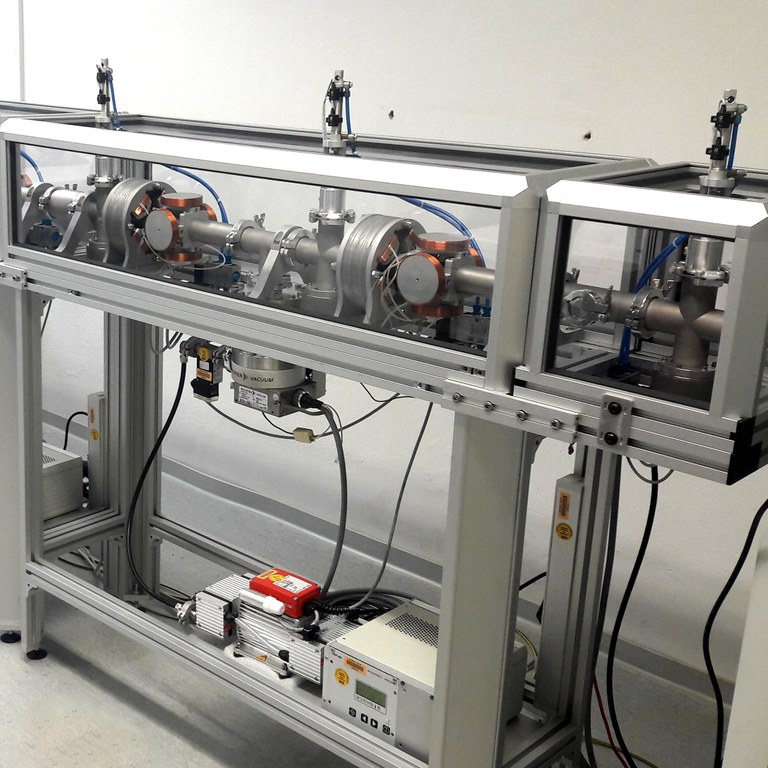Information about the winter-term course
Registration for the summer-term course is now open! Registration deadline: January 15, 2026.
Advanced Laboratory Course (physics601)
In the Advanced Lab Course, five experiments from the subject areas of accelerator, particle and detector physics (E), nuclear physics (K), atomic and laser physics (A) as well as optical and radio astronomy (S) are performed. Additionally, experiments on solid state physics can be performed at University of Cologne. Participation in the Preparatory Lab Course is a prerequisite for students who did not get their Bachelor degree at University of Bonn.
Further information:
- August to October 2025
- You can register for this course on basis until June 30, 2025. Only a limited number of positions are available. Please register for the waiting list, if you are not able to sign up for the lab course.
- De-registration deadline: August 15, 2025
- Mandatory preparatory meeting for Bonn and Cologne students: July 7, 8:15 - 10:00, Lecture Hall I, Nußallee 12/2.006 (PI)
Information on the Practical Course M Particle Physics (only for Cologne students):
- Registration deadline: April 8, 2025
- February to mid-May 2026
- You can register for this course on basis until January 15, 2026. Only a limited number of positions are available. Please register for the waiting list, if you are not able to sign up for the lab course.
- De-registration deadline: February 28, 2026
- Mandatory preparatory meeting for Bonn and Cologne students: Monday, February 2, 8:15 - 10:00, Lecture Hall HISKP, Nußallee 14-16, Room 0.023 (HISKP)
Experiments
- E106: Radiofrequency Cavities for Particle Acceleration
- E207: Lab course accelerator Bonn (LAB)
- E212: Properties of elementary particles
- E214: ATLAS
- E215: Investigation of particle-antiparticle oscillations at BELLE-II
- E217: STYX
- K223: Nuclear γ-γ angular correlations
- K225: Positron Lifetime in Metals and Insulators
- A245: Optical frequency doubling
- A246: Laser spectroscopy
- A248: Magneto-optic trap
- A249: Laser Gyroscope
- S261: Optical astronomy
- S262: Setting up a Radio-astronomical Receiver / Working with a Radio Interferometer
- S263: Photometry of star clusters
- S264: Radio astronomical observing course
- Experiments on solid state physics at University of Cologne
The criteria for selecting the experiments are explained below.

General information
- There are two courses taking place respectively from August to October and from February to April every year.
- Each experiment lasts one to two full days.
- The five experiments are carried out in fixed teams of two persons.
- There is no fixed schedule, the dates of the experiments are set in consultation with the tutors.
- Special features regarding the schedule of the lab experiments S261 "Optical astronomy", S263 "Photometry of star clusters" and S264 "Radio astronomical observing course":
- S261 and S263: the oral exams for the optical-astronomy labs are conducted beforehand as soon as possible in August (winter-term course) or in February (summer-term course) so that all the teams are prepared for the possibility of having an observation session at any given time depending on the weather. The observations take place from August to October in the winter-term course and from February to April in the summer-term one.
- S264:
- winter-term course: the oral exams are conducted in August, the observations take place mid-September;
- summer-term course: the oral exams are conducted in February, the observations take place mid-March.
The experiments can be selected from the list above and are allocated according to capacity.
The following rules apply:
- Physics students must carry out one of the experiments E214 (ATLAS) or E215 (Investigation of particle-antiparticle oscillations at BELLE-II).
- Astrophysics students must carry out two of the experiments S261 (Optical Astronomy), S262 (Setting up a Radio-astronomical receiver / Setting up a Radio Interferometer), S263 (Photometry of star clusters) or S264 (Radio astronomical observing course).
- Experiments must cover three different subject areas (E, K, A, S).
- Master's students can replace two experiments from the subject areas E, K, A or S with four experiments on solid state physics at University of Cologne. In this case, two additional subject areas must be covered in Bonn.
- successful completion of five experiments
- initial oral exam and written report for each experiment
- Lab plans, detailed information on the experiments and contact details of the tutors are available on eCampus.
The advanced lab course is accompanied by a seminar in which students present one of the experiments which they performed. Students are invited to participate on a voluntary basis. Presentations in the seminar are not graded.
Information on the seminar is available on eCampus.
To participate in the practical course on particle physics, students from Cologne University must register in the Online Database of the Practical Courses M. The number of students for this course is limited, students with prior knowledge and experience in particle physics are favored.
The practical course on particle physics consists of two experiments:
- The experiment E217 - STYX is mandatory.
- The second experiment will be one of the following:
Contact
M.Sc. Physik, Advanced Lab Course Dr. Barbara Valeriani-Kaminski, Dr. Tina Bantes